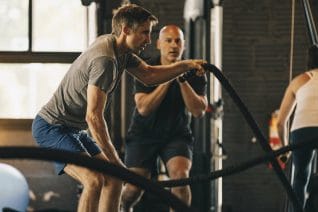
In this installment, we explore the real-world expectations for losing fat and building muscle, emphasizing the factors that influence these goals.
Understanding that fat loss isn’t a straight path is fundamental. Like daily weight fluctuations, fat loss varies day by day. It’s important to focus on long-term trends rather than minor daily shifts.
Typically, substantial fat loss happens early on, especially for those new to fitness or with more body fat. But as you progress, the pace of fat loss naturally decelerates—a normal and expected part of the journey.
Muscle gain follows a similar trend. Studies show that men can potentially add about 40 to 50 pounds of muscle throughout their lifting careers, while women might see gains of 20 to 25 pounds, particularly before the age of 30. Yet, gains are still achievable in later life, albeit at a slower rate.
Key Factors Influencing Fat Loss:
- Diet: Your calorie intake, the balance of macronutrients, meal timing, and diet quality all play pivotal roles. A balanced, nutritious diet is essential for maximizing fat reduction.
- Exercise: The type, intensity, and frequency of exercise significantly impact fat loss. A mix of cardio (like running, cycling, or swimming) and strength training boosts fat burning and enhances body composition.
- Sleep: Quality sleep is crucial for optimal fat loss, as poor sleep can disrupt hormonal balances and metabolism.
- Stress: High stress can hinder fat loss by increasing cortisol levels, which may promote fat storage.
- Hormonal Balance: Address any hormonal imbalances, such as thyroid issues or insulin resistance, with a healthcare professional to optimize weight loss.
Factors Influencing Muscle Gain:
- Nutrition: Adequate protein intake and proper nutrient timing support muscle repair and growth.
- Strength Training: Engaging in weightlifting or strength training exercises is vital. Compound movements like squats and deadlifts target multiple muscle groups, fostering overall muscle development.
- Progressive Overload: To continually build muscle, gradually increase your workout intensity by adding weights, increasing repetitions, or shortening rest periods.
- Recovery: Muscles need time to repair and grow. Including rest days in your exercise regimen is crucial for maximum gains.
- Genetics: Genetic predispositions can affect muscle growth potential, though everyone can improve with the right approach.
While not exhaustive, this list offers a foundation for understanding the dynamics at play in fat loss and muscle growth. Also, consider how life changes—like a new job, holidays, or family health issues—might impact your progress.
If you’re ready to make a positive change, whether it’s losing fat, gaining muscle, or simply enhancing your health, join us at Strength Warehouse. Book your free, no-sweat intro [here] and let us guide you to a healthier, more fulfilling lifestyle.
Stay tuned for Part 3, where we’ll discuss advanced strategies to overcome plateaus and sustain progress. Join us on this transformative journey at Strength Warehouse to unlock your full potential!
